The first big traillie/adventure bikes began to appear in the 1980s – bikes like the Honda Africa Twin 750 V-twin and the Yamaha Ténéré models – as well as a weird niche bike from BMW callled the R80 G/S (whatever happened to that?). They looked ready to take on a ride to the ends of the world, and, indeed, were capable of going a long way, as well as featuring in genuine desert rallying and racing.
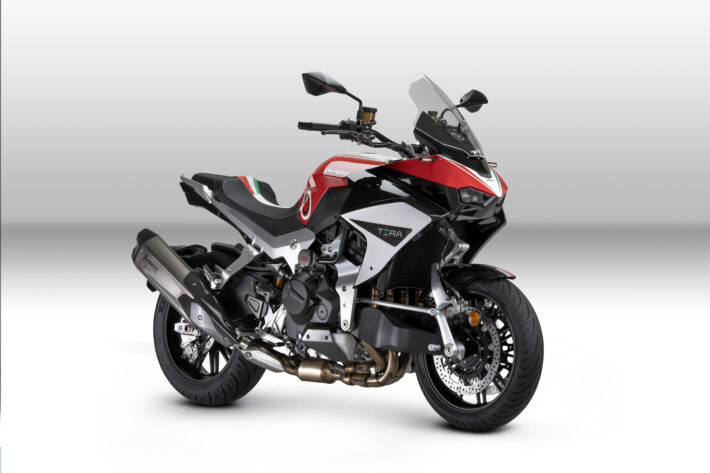
But 40 years ago, no-one could have predicted how that class would have turned out. Nowadays that BMW GS class is a behemoth in terms of sales, and gets the very best flagship technology and performance. Honda’s Africa Twin is now an 1100, and Yamaha’s Ténéré is a mini sub-brand of its own with a wide range of capable machinery.
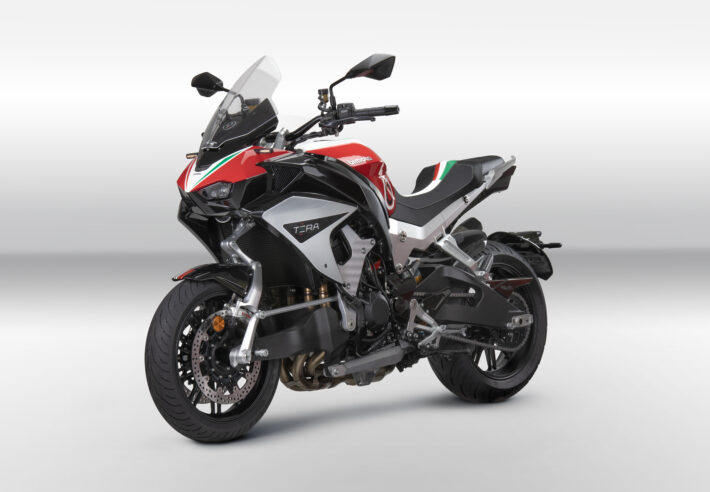
And now we have this – the Bimota Tera. It features a Kawasaki H2 supercharged 999cc engine, making 200bhp, in the trademark Bimota Tesi-style chassis. A Bimota touring bike would have seemed as likely as Frank Spencer joining the SAS back in 1983, when Bimota was building high-end track-friendly superbikes, with the finest handling chassis designs around.
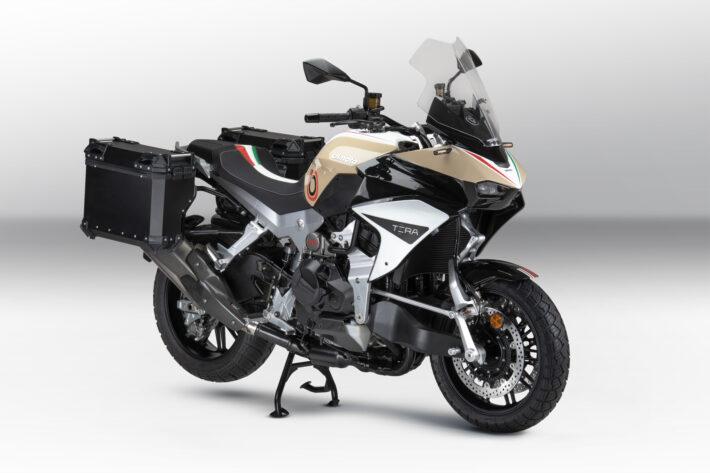
Sure, Bimota had history of using Kawasaki engines: its raison d’etre was making bikes that handled much better than standard Japanese motorcycles, while using the excellent powertrains from the big four firms. But a big trailbike? Sacrilege doesn’t begin to cover how that would have seemed to 1980s bikers.
So that’s the history – what about the new 2024 bike? Well, Bimota is now owned by Kawasaki outright, so is being run as a sort of Skunkworks or black projects department. And again, it’s marrying up premium Japanese engines with unique Italian designed chassis and styling. And it’s gone to the extreme ends of chassis technology, using the ‘Tesi’ concept pioneered in the 1980s at Bimota.
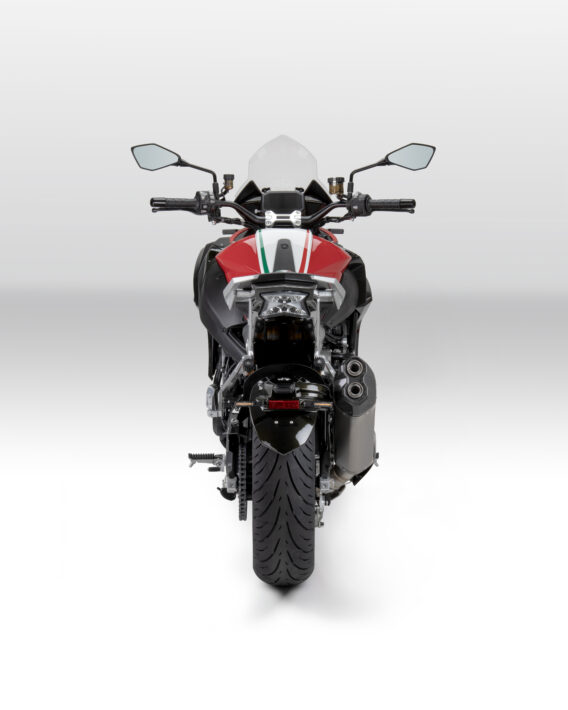
Tesi is Italian for ‘thesis’ and the original design came from the university projects of engineer Pierluigi Marconi. The main idea is to have a front swingarm rather than forks, with the wheel steering using a hub-centre linkage. That gives a direct mechanical path for braking force from the wheel into the chassis, instead of transferring the force through a pair of springs as on a telescopic fork.
Suspension is managed by a conventional monoshock linkage, and a series of rods connect the handlebars to the steering components inside the front wheel hub. The back end uses a standard monoshock swingarm.
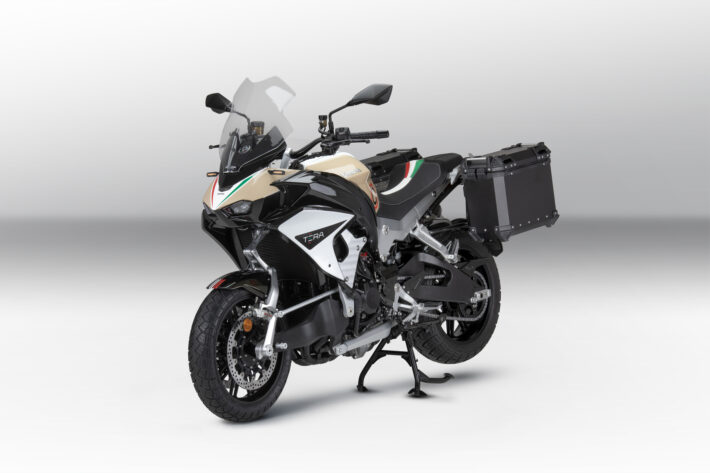
The original Tesi used a Ducati V-twin engine, with a pair of aluminium plates linking this front suspension setup to the rear swingarm, and it worked well, though it needed a different approach to track setup and riding style. The lack of dive on braking was an advantage in theory, but in practice, riders were already used to it, and had to adapt to the different front end feel.
The 2024 Bimota Tera takes that Tesi tech, and applies it to a full-bore high-end adventure tourer – though it’s very much on the Tarmac end of the big traillie spectrum. That means it’s set to take on the likes of the BMW M1000 XR and Ducati’s Multistrada V4S rather than more dirt-focused machinery. A fast sporting tourer, with longer travel suspension then.
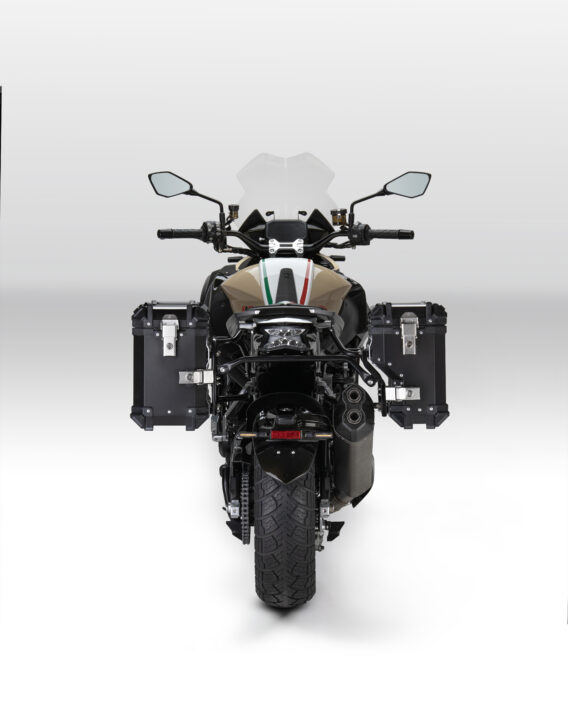
The Tera is a fearsome looking piece of kit, with that 200bhp supercharged 999cc inline-four engine bolted into the premium Tesi chassis. There are four large milled alloy frame plates that link the front and rear swingarms to the engine, while also providing mountings for suspension, steering, rider and pillion seating, bodywork and luggage.
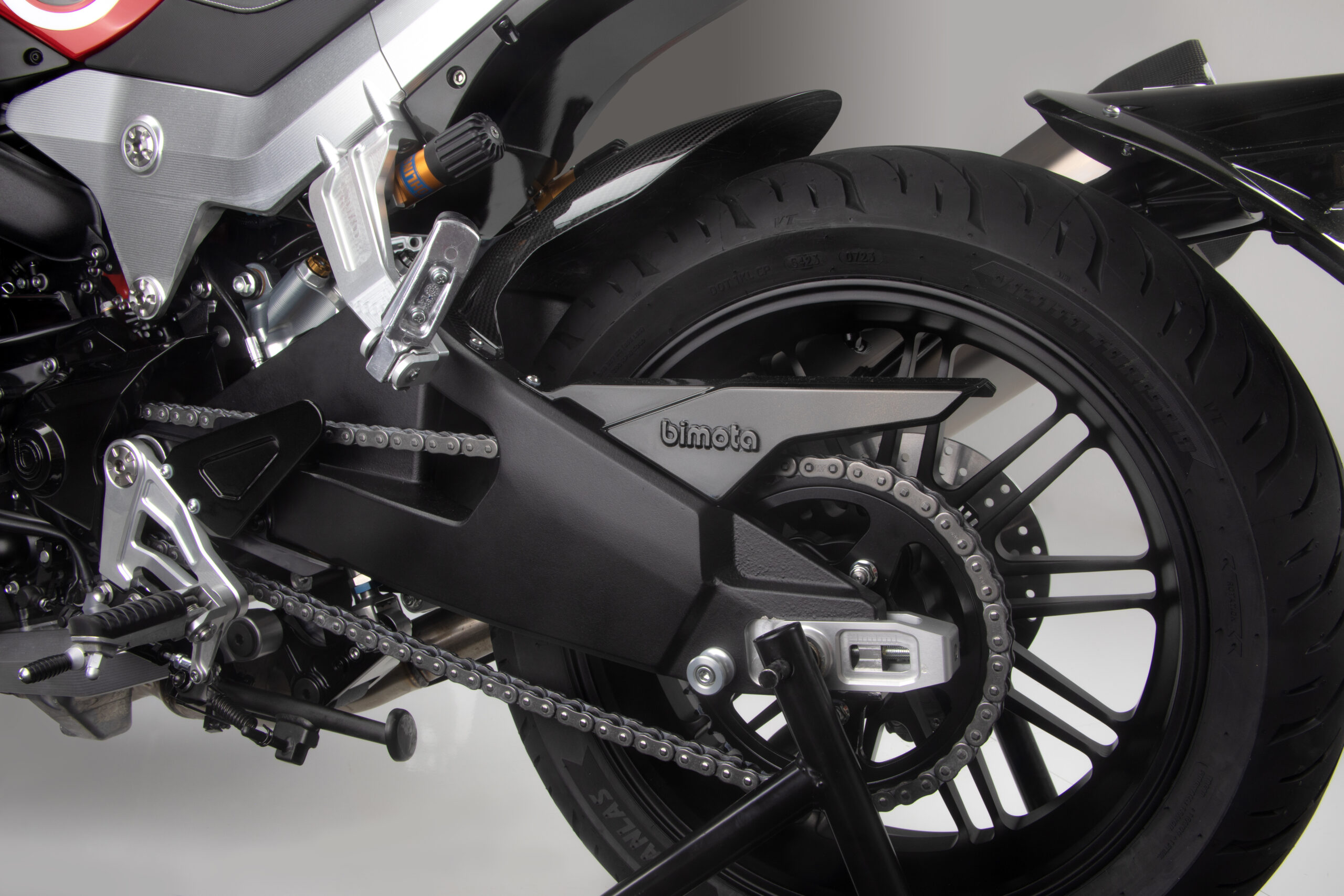
It features Öhlins TTX race shocks at both ends, with a decent 114mm front/135mm rear of travel, and there’s also the option of Marzocchi semi-active electronic kit with 145mm front/165mm rear of travel. There are two Brembo Stylema front calipers which are almost hidden by the steering linkages, and sporty 17” tyre sizes – so no knobblies for this beastie…
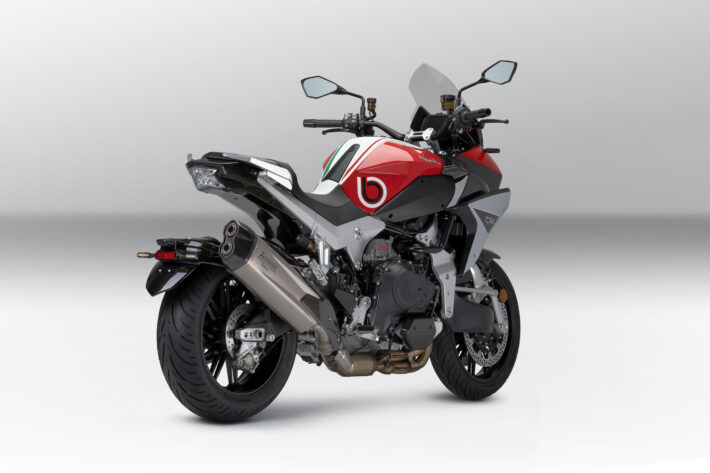
On top of that chassis and engine setup is some lovely adventure touring bodywork in aluminium and carbon fibre, complete with spacious dual seating, panniers, full touring windscreen and top fairing. Upright bars, low pegs, a 22-litre fuel tank, and a set of plush touring kit from Kawasaki’s H2 SX sports tourer complete with cruise control, colour LCD dash, ABS and traction control all adds up to probably the least Bimota-ish Bimota ever.
There’s no information as yet on weight, price or availability, and to be honest, Bimota has never been very good at that sort of thing. We expect the Kawasaki ownership to be improving these matters though, and look forward to seeing the Tera on the road soon (we’re not so sure about seeing it off-road). More info: www.bimota.it
Bimota Tera specifications
Engine: Inline-four DOHC, 4-valve, liquid-cooled, supercharged, 998cc
Bore x stroke: 76.0 x 55.0mm
Compression ratio: 11.2:1
Power: 147.1 Kw / 200 hp @11,000rpm
Torque: 137,0 Nm / 101 lbf-ft @ 8,500rpm
Fuel System: EFI Euro-5+
Gearbox: six-speed, constant mesh, wet clutch, chain final drive
Frame: aluminium alloy plates billet machined, with rear swingarm mounting plate
Front suspension/wheel travel: Öhlins TTX 36 nitrogen gas charged shock with piggyback reservoir, compression and rebound damping and adjustability and hand-turn spring preload adjustability, and top-out spring/114 mm (4,48 in)
OPTIONAL : Marzocchi semi-active suspension system (wheel travel 145 mm / 5,70 in)
Rear suspension/wheel travel: Öhlins TTX36 nitrogen gas charged shock with piggyback reservoir, compression and rebound damping and adjustability and hand-turn spring preload adjustability, and top-out spring/135 mm (5,31 in)
OPTIONAL : Marzocchi semi-active suspension system (wheel travel 165 mm / 6,49 in)
Front brakes: Dual radial-mount, opposed 4-piston Brembo Stylema® calipers, dual semi-floating 330 mm discs, KIBS ABS
Rear brakes: Opposed 2-piston calipers, single 220 mm disc, KIBS ABS
Tyres : Front 120/70ZR 17 M/C (58W) Rear 190/55ZR17 M/C (75W)
Ground clearance: 174 mm (+/-30 mm) / 6.85 in (+/-1,18 in)
Seat height: 820 mm (+/-30 mm) / 32,28 in (+/-1,18 in)
Kerb weight: n/a
Fuel capacity: 22l
Wheelbase: 1.445 mm / 56.89 in
Electronic Rider Aids: Kawasaki Cornering Management Function (KCMF), Kawasaki Traction Control KTRC (3-MODE), Kawasaki Launch Control Mode (KLCM), Brembo Stylema Calipers, Kawasaki Intelligent anti-lock Brake System (KIBS), Kawasaki Quick Shifter (KQS) (upshift & downshift), Electronic Cruise Control, All Led Lightning, Full-Colour LCD TFT screen, Assist & Slipper Clutch.
